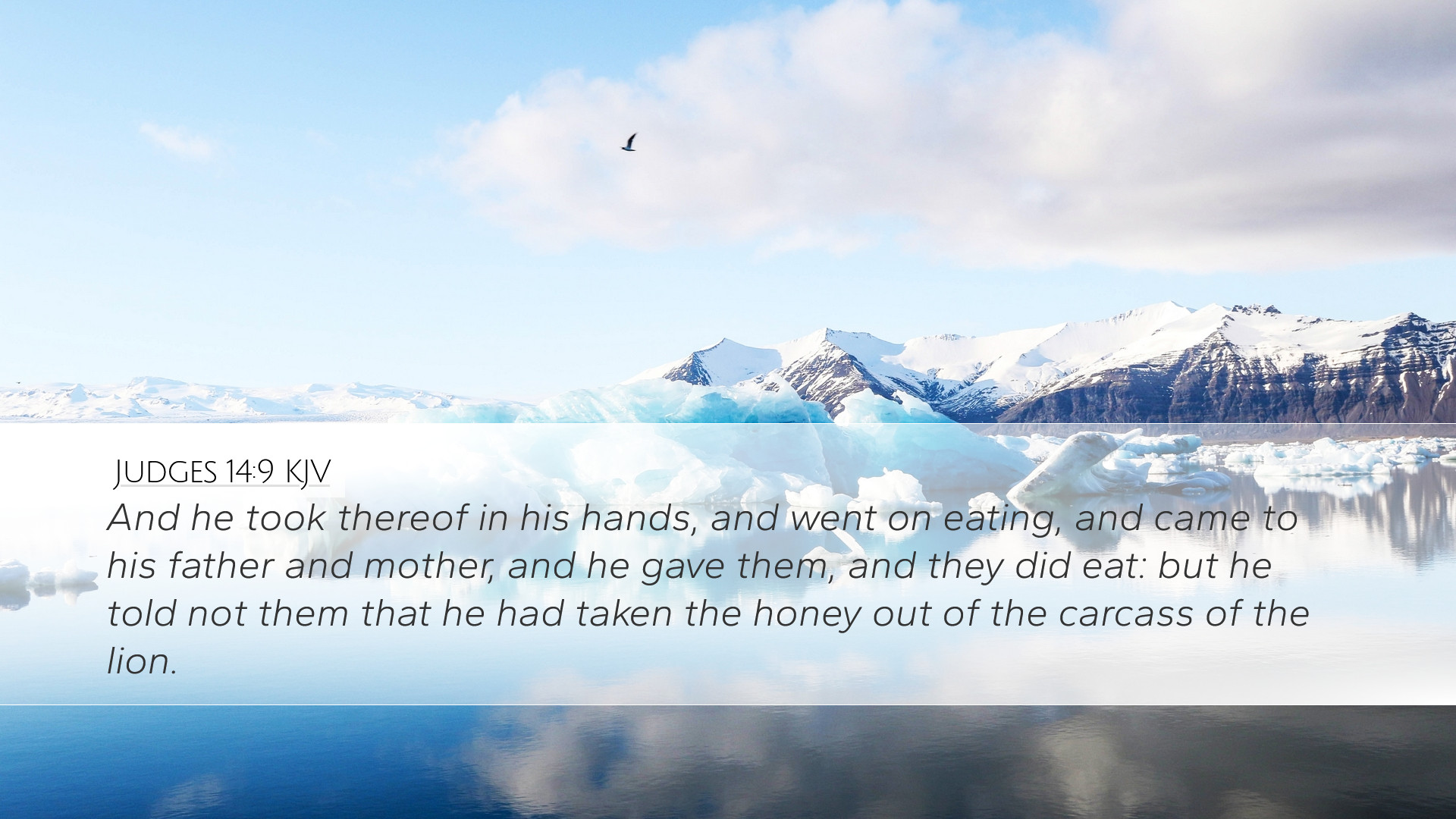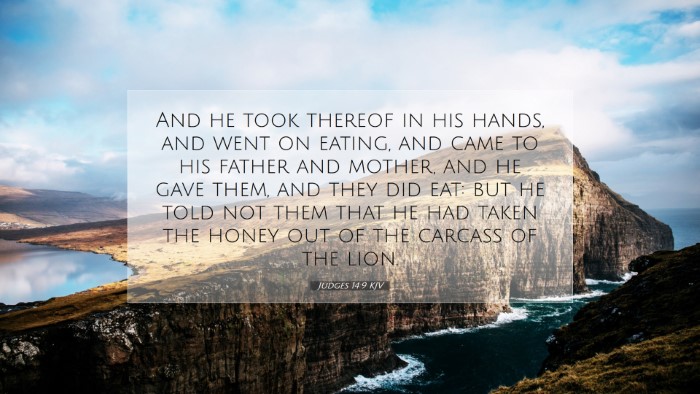Old Testament
Genesis Exodus Leviticus Numbers Deuteronomy Joshua Judges Ruth 1 Samuel 2 Samuel 1 Kings 2 Kings 1 Chronicles 2 Chronicles Ezra Nehemiah Esther Job Psalms Proverbs Ecclesiastes Song of Solomon Isaiah Jeremiah Lamentations Ezekiel Daniel Hosea Joel Amos Obadiah Jonah Micah Nahum Habakkuk Zephaniah Haggai Zechariah MalachiJudges 14:9
Judges 14:9 KJV
And he took thereof in his hands, and went on eating, and came to his father and mother, and he gave them, and they did eat: but he told not them that he had taken the honey out of the carcass of the lion.
Judges 14:9 Bible Commentary
Commentary on Judges 14:9
Introduction
Judges 14:9 presents a significant moment in the life of Samson, portraying elements that are both cultural and theological. This verse captures the complexities of his character and the unfolding narrative that foreshadows his pivotal role in Israel's history. In this commentary, insights from public domain sources such as Matthew Henry, Albert Barnes, and Adam Clarke will elucidate the layered meanings of this scripture.
Text of Judges 14:9 (KJV)
"And he took thereof in his hands, and went on eating, and came to his father and mother, and he gave them, and they did eat: but he told them not that he had taken the honey out of the carcase of the lion."
Contextual Overview
This verse occurs within the broader narrative of Samson's life, specifically during his encounter with a lion and the subsequent discovery of honey within the carcass. The context reveals workings of divine purpose as well as the implications of Nazarite vows, from which Samson often deviated. As a student of Scripture, recognizing the historical and social backgrounds of this passage is essential for a deeper understanding.
Commentary Insights
Matthew Henry's Insights
Henry emphasizes the symbolic nature of the honey and the lion's carcass. The lion is often representative of challenges or threats, whereas honey symbolizes sweetness or something delightful found amidst hardship. Henry notes that Samson's act can be seen as a foreshadowing of the larger narrative of Israel's deliverance: sweet victory emerging from the threat of oppression.
Additionally, Henry highlights the disobedience inherent in Samson’s actions, particularly concerning his Nazarite vows. By touching the carcass, Samson not only defiles himself ritualistically but also engages in a motif of compromise—one that resonates with the broader themes of Israel's struggle with fidelity to God's commandments.
Albert Barnes' Perspectives
Barnes provides a practical view of the implications of Samson bringing honey to his parents. He points out that although he shared the honey, he deliberately withheld the source of it. This act reflects a significant moral and ethical concern as it indicates an intentional concealment of disobedience. Barnes argues that this starkly defines the dual life Samson lived—one that showcased strength yet harbored vulnerability.
Furthermore, Barnes elaborates on how the act of eating honey from the carcass can be seen as appealing to human desires while ignoring divine law. He notes that this episode acts as a caution against rationalizing sinful actions for the sake of gratification. This commentary encourages readers to reflect on the nature of their own compromises and the hidden consequences they might carry.
Adam Clarke's Reflections
Clarke provides a historical interpretation by addressing the cultural significance of honey in ancient Israel. Honey was considered a delicacy and was often associated with abundance. He points out that Samson's choice to consume honey from a dead lion illustrates both his personal desires and the broader theme of spiritual decay within Israel at that time.
Clarke also expounds on the implications of parental relationships in the narrative. By sharing his find with his parents while withholding its origin, Samson not only disobeys his Nazarite vow but also disturbs the familial dynamics. This perceived dishonesty can lead to a reflection on the integrity of one's relationships, especially in the light of spiritual responsibility. His commentary encourages a deeper look into how one's actions affect others.
Theological Implications
The theological implications of Judges 14:9 are manifold. At a foundational level, this verse invites a critical examination of the concept of obedience in the life of a believer. The complexity of Samson's character demonstrates how divine purposes can operate even through flawed individuals.
- Obedience versus personal desire: Samson’s choice to consume honey, despite its source, illustrates the struggle between divine law and personal gratification. It serves as a reminder for believers of the necessity of aligning personal actions with God's commandments.
- Divine sovereignty: The narrative indicates that God can work through even the shortcomings of His chosen ones. Despite Samson's transgression, he continues to play a role in God’s redemptive plan for Israel, suggesting that human failure does not thwart divine intention.
- Hidden sins: The act of concealing the source of the honey signals the dangers of hidden sin. The commentary encourages a spirit of transparency and accountability within the faith community.
Conclusion
Judges 14:9 encapsulates critical lessons for pastors, students, and scholars alike. The insights drawn from the commentaries of Matthew Henry, Albert Barnes, and Adam Clarke highlight the intricate balance between human frailty and divine purpose. As we reflect on this scripture, we are reminded of the importance of integrity in our walk with God, the necessity of obedience, and the understanding that God remains sovereign despite our shortcomings. In this light, the verse stands not only as a historical account but as a living text that speaks to the heart of faith and practice.


